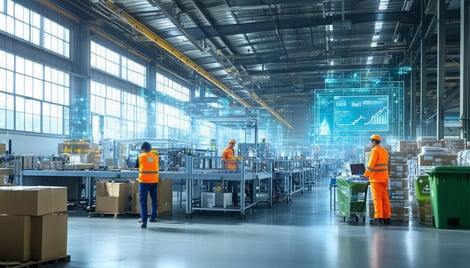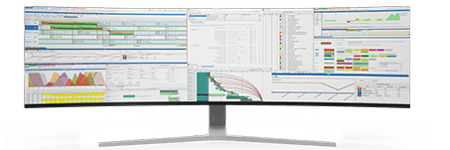
Navigating Disruption: How Supply Chain Managers in Packaging Manufacturing Can Achieve Agility and Efficiency
Supply chain disruptions are no longer a rare anomaly but a persistent challenge. From raw material shortages to fluctuating consumer demand, the packaging manufacturing sector faces unique hurdles. For Supply Chain Managers in this industry, the need to respond with agility and efficiency has never been greater.
Fortunately, advanced tools like PlanetTogether, integrated with enterprise systems such as SAP, Oracle, Microsoft, Kinaxis, or Aveva, offer transformative solutions.

The Challenges Facing Supply Chain Managers
Packaging manufacturing operates at the intersection of diverse industries, including food and beverage, pharmaceuticals, and e-commerce. Each sector presents unique requirements, making the supply chain inherently complex. Key challenges include:
Demand Volatility: Shifts in consumer behavior, driven by trends or global events, can create sudden spikes or drops in demand.
Supply Disruptions: Raw material shortages, logistics bottlenecks, and geopolitical factors often lead to unanticipated delays.
Sustainability Pressures: Regulatory mandates and customer expectations demand sustainable practices, adding layers of complexity.
Cost Management: Balancing operational costs with quality and delivery timelines remains a constant challenge.
To thrive in this environment, packaging manufacturers must embrace technology to enhance visibility, streamline processes, and foster agility.
![]()

Leveraging Integration: PlanetTogether and Enterprise Systems
The integration of advanced production scheduling tools like PlanetTogether with ERP systems such as SAP, Oracle, Microsoft Dynamics, Kinaxis, or Aveva creates a powerful framework for tackling disruptions. Let’s explore how this synergy drives agility and efficiency:
1. Enhanced Visibility Across the Supply Chain
Integration enables real-time data sharing between PlanetTogether and ERP systems, providing end-to-end visibility. For example:
Scenario Planning: With Kinaxis, PlanetTogether can simulate various scenarios, such as supplier delays or sudden demand increases. This allows managers to identify potential bottlenecks and develop contingency plans.
Inventory Insights: SAP’s robust inventory management features, combined with PlanetTogether’s scheduling capabilities, ensure optimal stock levels, reducing both shortages and overstock situations.
2. Proactive Decision-Making
Disruptions demand swift and informed decisions. Integration facilitates this by:
Dynamic Rescheduling: PlanetTogether’s advanced algorithms can automatically adjust production schedules in response to changes, while Oracle ERP provides updated resource availability data.
Predictive Analytics: Leveraging Microsoft’s AI tools, combined with PlanetTogether’s planning features, enables predictive maintenance and demand forecasting.
3. Streamlined Collaboration
Supply chain resilience depends on seamless collaboration between stakeholders. Integrated systems bridge communication gaps:
Supplier Coordination: With Aveva’s industrial software, supply chain managers can monitor supplier performance and collaborate to resolve issues proactively.
Cross-Departmental Alignment: PlanetTogether’s schedules, synced with SAP or Oracle’s ERP platforms, ensure that production, procurement, and logistics teams work from the same playbook.
4. Increased Agility Through Automation
Automation is the cornerstone of efficiency. Integration empowers automation at multiple levels:
Order Fulfillment: Kinaxis’s rapid response capabilities, combined with PlanetTogether’s scheduling precision, ensure timely order fulfillment even during disruptions.
Workflow Optimization: Automated workflows between Microsoft Dynamics and PlanetTogether minimize manual intervention, reducing errors and saving time.

Practical Steps to Build an Agile and Efficient Supply Chain
To fully harness the potential of these integrations, Supply Chain Managers in packaging manufacturing should follow these steps:
Step 1: Assess Current Capabilities
Evaluate your existing systems and processes to identify gaps in visibility, efficiency, and collaboration. For instance, assess whether your ERP system provides the level of granularity needed for effective scheduling.
Step 2: Prioritize Integration
Work with IT and operations teams to integrate PlanetTogether with your chosen ERP system. Focus on:
Data Synchronization: Ensure real-time data flow between systems.
User Training: Equip teams with the skills to leverage integrated tools effectively.
Step 3: Leverage Advanced Analytics
Use predictive and prescriptive analytics to anticipate disruptions and optimize responses. For example:
Analyze historical data to forecast demand trends.
Monitor machine performance to schedule maintenance proactively.
Step 4: Foster a Culture of Agility
Technology is only as effective as the people using it. Encourage a mindset of adaptability by:
Conducting regular scenario planning exercises.
Empowering teams to make data-driven decisions.
Step 5: Measure and Iterate
Continuously measure key performance indicators (KPIs) such as lead times, on-time delivery rates, and inventory turnover. Use these insights to refine processes and technologies.
The Competitive Edge: Sustainability and Resilience
Beyond operational efficiency, integrated systems support broader goals such as sustainability and resilience:
Sustainability: By optimizing production schedules and reducing waste, PlanetTogether and ERP integrations help meet environmental goals.
Resilience: Real-time visibility and dynamic scheduling enable faster recovery from disruptions, ensuring business continuity.
For Supply Chain Managers in packaging manufacturing, tackling disruption with agility and efficiency is both a challenge and an opportunity. By leveraging the integration of PlanetTogether with ERP systems like SAP, Oracle, Microsoft, Kinaxis, or Aveva, organizations can build resilient, adaptive, and efficient supply chains.
In a world where change is the only constant, investing in these technologies ensures not just survival but sustained success in a competitive market. Are you ready to take your manufacturing operations to the next level? Contact us today to learn more about how PlanetTogether can help you achieve your goals and drive success in your industry.
Topics: PlanetTogether Software, Integrating PlanetTogether, Streamlined Collaboration, Proactive Decision-Making, Enhanced Visibility Across the Supply Chain, Packaging Manufacturing, Increased Agility Through Automation




















LEAVE A COMMENT